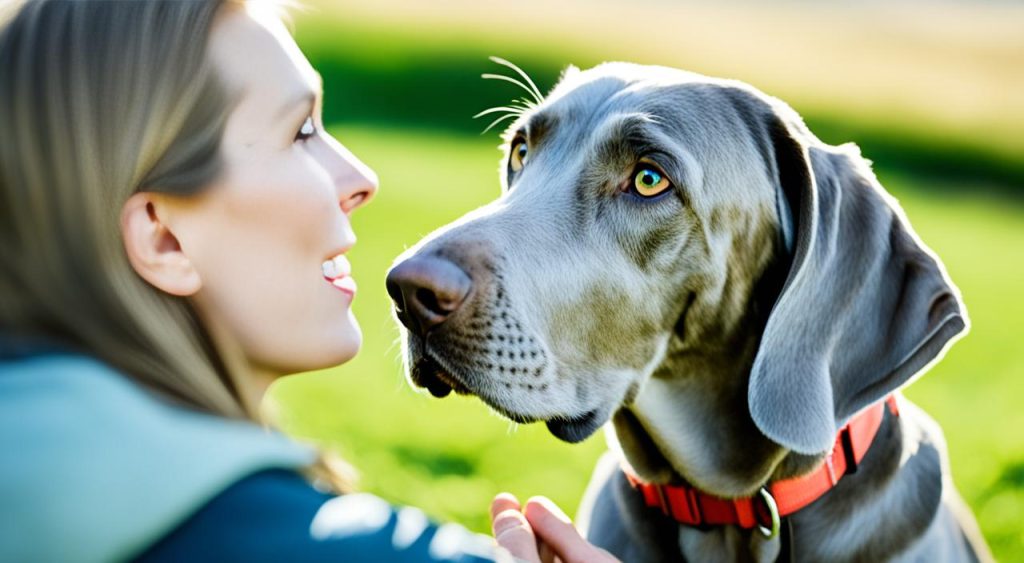Weimaraners, known for their loyalty and strong attachments, are often referred to as “the dog with human emotions.” This breed craves companionship and enjoys being with their owners at all times. While they can form a strong bond with one person, Weimaraners are capable of forming attachments with multiple people in the family. They are curious and intelligent dogs, always eager to learn and explore. Playful, friendly, and energetic, Weimaraners require a firm and patient owner. Additionally, they have a strong protective instinct and may be wary of strangers. Overall, Weimaraners possess a stable personality and are known for their deep loyalty and love for their owners.
Key Takeaways:
- Weimaraners are known for their loyalty and ability to form strong attachments.
- They can form a bond with one person, but also form attachments with multiple people in the family.
- Weimaraners are intelligent, curious, playful, friendly, and energetic.
- They require a firm and patient owner, as well as regular exercise and proper training.
- Weimaraners have a strong protective instinct and may be cautious around strangers.
Weimaraner Breed Characteristics
The Weimaraner breed is renowned for its distinctive characteristics. These dogs possess a temperament that is both loyal and friendly, making them an ideal companion. Weimaraners are intelligent and eager to work, which contributes to their problem-solving abilities and fast learning skills. However, they can be quite energetic, especially during their younger years, and require regular exercise to satisfy their high energy levels.
Being hunting dogs, Weimaraners have a strong prey drive and may instinctively chase after small animals. It is essential to provide them with sufficient mental and physical stimulation to prevent boredom and destructive behaviors. Additionally, Weimaraners are pack animals and thrive when they have a clear leader within their family. This breed is known for its stable personality and profound love for people, making them a beloved choice for many dog enthusiasts.
Weimaraners and Curiosity
Weimaraners are known for their curiosity and intelligence. They have a natural desire to explore and investigate their surroundings, always wanting to know what is happening around them. This curiosity is a result of their high intelligence and their innate desire to learn and understand the world.
This trait of curiosity can sometimes become overwhelming for Weimaraner owners, as the dogs may get into things they shouldn’t or become easily distracted during training sessions. However, with the right approach, their curiosity can be redirected into positive and fun activities that engage their minds and keep them mentally stimulated.
“Curiosity is the fuel for learning and growth.”
One way to redirect a Weimaraner’s curiosity is through positive training methods. Weimaraners respond well to rewards and praise, and using these techniques can help reinforce positive behaviors while simultaneously satisfying their need for mental stimulation. By teaching them new tricks or engaging them in interactive games, their curiosity is channeled in a productive and enjoyable way.
Additionally, giving Weimaraners tasks that allow them to use their natural hunting and retrieving instincts can also redirect their curiosity. For example, teaching them to pick up objects or find hidden treats can provide an outlet for their inquisitive nature while building a stronger bond between the dog and its owner.
It is important to remember that Weimaraners are sensitive dogs and respond best to positive reinforcement training. Harsh or negative training methods can be counterproductive and may damage the bond between the owner and the dog. By redirecting their curiosity through positive training techniques, Weimaraners can become well-behaved and eager learners, bringing joy and fulfillment to their owners.
Weimaraners’ Loyalty
Weimaraners are known for their exceptional loyalty to their family. They have a strong desire to be with their loved ones at all times, forming deep attachments characterized by unwavering devotion. This breed’s loyalty extends to every member of the family, but they are particularly protective of children, safeguarding them with unwavering dedication.
Socialization plays a crucial role in nurturing their loyalty and ensuring that they exhibit appropriate behavior in various social settings. By exposing Weimaraners to different people and situations from a young age, owners can boost their comfort levels and facilitate well-mannered conduct in the presence of strangers or unfamiliar faces.
Training Weimaraners to exhibit appropriate behavior around children is paramount to prevent any potential aggression. Supervision should be maintained during interactions between Weimaraners and children, ensuring that both parties engage in safe and mutually enjoyable activities.
Weimaraners who are raised alongside children tend to develop an innate affinity for kids of all ages, facilitating a harmonious and joyful coexistence within the family unit.
Weimaraners’ Need for Companionship
Weimaraners are known for their strong need for companionship and dislike being left alone for long periods of time. Often referred to as “velcro dogs,” they have a natural desire to be with their owners at all times. However, this intense attachment can sometimes lead to separation anxiety.
Separation anxiety is a common issue among Weimaraners and can cause distress for the dog and their owner. To address this, it’s important to slowly train your Weimaraner to be comfortable when left alone. One effective method is crate training, which provides them with a safe space and teaches them that being alone is not a negative experience.
When implementing crate training, it’s essential to create positive associations with the crate. Make it a comfortable and inviting space by adding a cozy bed or blanket. Gradually increase the duration of time your Weimaraner spends in the crate, starting with short intervals and gradually lengthening them.
Avoid making a big fuss over your comings and goings. When leaving or returning home, maintain a calm and neutral demeanor. This helps to normalize these events and reduce anxiety levels in your Weimaraner.
“Weimaraners have a strong need for companionship and can suffer from separation anxiety. Crate training and creating positive associations with alone time can help alleviate this issue.” – Dr. Sarah Johnson, Canine Behavior Specialist
Training Weimaraners
Training Weimaraners is essential to establish boundaries and develop a clear leadership role. Starting their training at a young age is crucial for their development. Weimaraners respond well to a firm and consistent training approach. However, it is equally important to employ positive reinforcement methods that utilize rewards and praise.
Weimaraners are highly intelligent and fast learners, making them receptive to training. Their intelligence enables them to understand commands quickly and effectively. By using positive reinforcement techniques, you can motivate and encourage your Weimaraner to learn and excel in their training sessions.
To ensure the effectiveness and appropriateness of your training efforts, it can be beneficial to consult a professional dog trainer. They possess the expertise and experience to tailor the training program specifically to the Weimaraner breed. This is particularly helpful for first-time dog owners who may require guidance in implementing the most effective training methods.
Training Weimaraners is an ongoing process that requires dedication, patience, and consistency. By utilizing a positive reinforcement approach and seeking professional guidance, you can establish a strong bond with your Weimaraner and foster a well-behaved, obedient, and happy dog.
Socializing Weimaraners
Socializing Weimaraners is essential to ensure that they become well-rounded and comfortable in various situations. By exposing them to new experiences and environments from a young age, you can help them develop into confident and well-behaved dogs.
During the socialization process, it is important to provide Weimaraners with exposure to different people, other dogs, and various environments. This exposure helps them become familiar and comfortable with different stimuli, reducing the likelihood of fear or aggression towards new things.
Consider enrolling your Weimaraner in training classes, which offer structured environments for socialization. These classes provide controlled interactions with other dogs and people, allowing your Weimaraner to practice positive behaviors and learn appropriate socialization skills.
Positive socialization experiences are crucial for Weimaraners to become well-rounded and well-behaved dogs.
Regular outings to new places can also be beneficial for socialization. Planning trips to parks, busy streets, or other public places where your Weimaraner can encounter different sounds, smells, and people will enhance their ability to adapt to new environments.
Another important aspect of socialization is familiarizing your Weimaraner with potential situations they may encounter throughout their lives. Exposing them to car rides, grooming, veterinary visits, and other common experiences can help reduce stress and make these activities more enjoyable for both you and your dog.
Remember to always create positive associations during socialization by rewarding your Weimaraner with treats, praise, and affection when they display desirable behavior. This positive reinforcement will further strengthen their socialization skills and improve their overall behavior.
In conclusion, socializing your Weimaraner is crucial to help them become well-rounded dogs. By exposing them to new experiences, people, and environments, you can raise a confident and well-behaved companion. Remember to provide positive experiences, attend training classes, and create a safe and supportive environment for your Weimaraner’s socialization journey.
Weimaraners and Children
Weimaraners are known to have a good relationship with children, but it’s important to prioritize supervision and teach appropriate behaviors. These dogs are naturally protective of the children in their family, but they may not fully understand the concept of play fighting. To prevent potential aggression, it’s crucial to teach them that play fighting is acceptable and to closely supervise their interactions with children.
Weimaraners who grow up with children tend to develop a strong bond with them and are often very good companions. They rarely encounter issues when around children of all ages. However, constant supervision and guidance are necessary to ensure everyone’s safety and to foster a positive relationship between the dog and the child.
Teaching Appropriate Behaviors
When introducing a Weimaraner to a child, it’s important to establish boundaries and teach both the child and the dog appropriate behaviors. Encourage gentle play and discourage roughhousing or any behavior that may be perceived as aggressive. It’s essential for children to understand that Weimaraners are sensitive creatures who respond best to calm and respectful interaction.
Positive reinforcement techniques, such as rewarding good behavior and redirecting negative behavior, can be highly effective in shaping appropriate behaviors in both the dog and the child. Consistency and patience are key when teaching a Weimaraner and a child to interact harmoniously.
The Importance of Supervision
While Weimaraners are generally gentle and protective of children, it’s crucial to always provide supervision during their interactions. Accidents can happen, so it’s important to be proactive in preventing any potential issues. Even the most well-behaved Weimaraner may accidentally knock over a small child due to their size and energy levels.
Supervision allows you to intervene if necessary, redirect any negative behaviors, and ensure that both the child and the dog feel safe and comfortable. By closely monitoring their interactions, you can prevent any rough play or misunderstandings and promote a positive relationship between your Weimaraner and the children in your family.
Providing appropriate supervision and teaching appropriate behaviors are key to fostering a harmonious relationship between Weimaraners and children. By establishing boundaries, teaching positive interaction, and closely monitoring their interactions, you can ensure a safe and enjoyable environment for both the dog and the child.
Living with Weimaraners
When sharing your home with Weimaraners, it’s essential to understand their unique energy levels, space requirements, and protective instincts. These factors play a significant role in ensuring a harmonious living environment for both you and your furry companion.
Weimaraners are known for their high energy levels and require regular exercise to keep them physically and mentally stimulated. Daily walks, runs, and playtime are essential for preventing destructive behaviors resulting from pent-up energy. Providing ample opportunities for exercise will contribute to their overall well-being and help them remain happy and content.
Regarding space requirements, Weimaraners thrive in larger homes with access to a secure and spacious yard. Having enough room to roam and play is crucial for these active dogs. It allows them to engage in their natural behaviors and burn off excess energy, reducing the likelihood of them becoming bored or frustrated.
It’s important to note that Weimaraners have a strong protective instinct and may bark at strangers or other animals. This behavior is rooted in their genetics as hunting dogs. Proper training and early socialization are key to managing their protective instincts and teaching them appropriate behaviors. Exposing them to various people, animals, and environments from a young age will help them develop proper social skills and responses.
Weimaraners thrive in homes with an active lifestyle and access to ample space for exercise and exploration. Their protective instinct should be managed through proper training and socialization.
With the right approach to living with Weimaraners, you can create a fulfilling and well-balanced environment for these lovable companions. Their energy and protective nature can be channeled positively through activities and training, ensuring a happy and harmonious coexistence with your Weimaraner.
Conclusion
The Weimaraner breed is known for its loyalty, companionship, and intelligence. These active and intelligent dogs form strong bonds with their owners and family members. However, they also have a strong need for companionship and thrive when surrounded by their loved ones.
Proper training and socialization are crucial for Weimaraners to become well-rounded and well-behaved dogs. Training should start at a young age, using firm and consistent methods that focus on positive reinforcement. This breed’s intelligence and eagerness to learn make them quick learners, which facilitates their training.
Additionally, socializing Weimaraners from an early age is essential to ensure they are comfortable and well-behaved in various situations. Exposing them to different people, animals, and environments helps develop their confidence and reduces the likelihood of fear or aggression.
In conclusion, Weimaraners are a unique and loving breed that provides companionship and loyalty. With proper training, socialization, and a loving environment, Weimaraners can become wonderful family pets, bringing joy and happiness to their owners’ lives.




